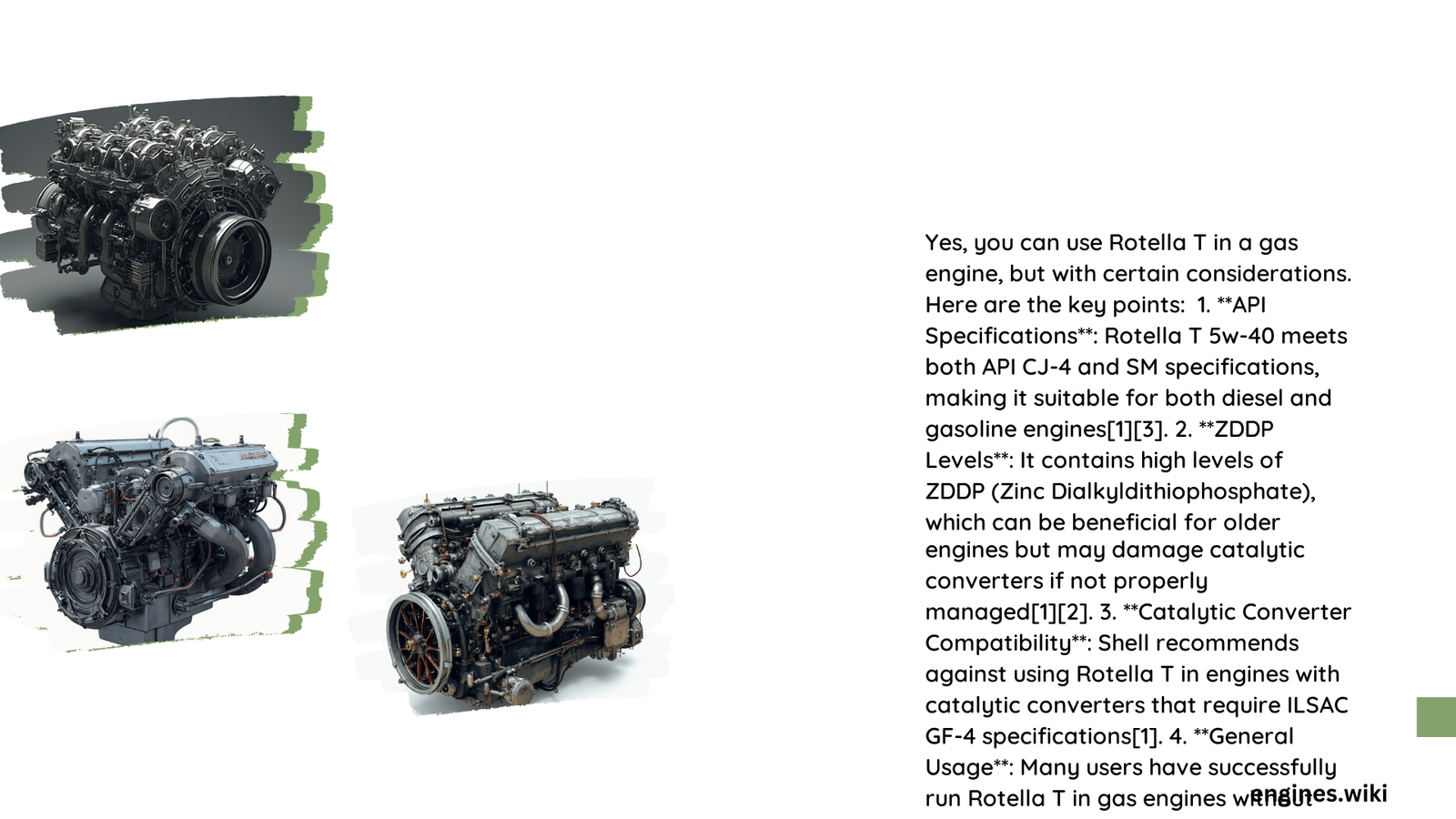Using Rotella T in a gasoline engine is possible but requires careful consideration. While Rotella T 5W-40 meets both API CJ-4 and SM specifications, making it technically compatible with diesel and gasoline engines, its high ZDDP content can be harmful to catalytic converters requiring ILSAC GF-4 specifications. This article explores the compatibility, performance benefits, and potential risks of using Rotella T in gas engines, helping you make an informed decision for your vehicle’s needs.
What Are the Compatibility Specifications for Rotella T in Gas Engines?
Rotella T’s compatibility with gasoline engines depends on several factors:
- API Specifications: Rotella T 5W-40 meets API CJ-4 and SM specifications, making it suitable for both diesel and gasoline engines.
- ILSAC GF-4 Requirements: Engines with catalytic converters requiring ILSAC GF-4 specifications are not compatible with Rotella T due to its high ZDDP content.
- Engine Age: Older gasoline engines without strict catalytic converter requirements may be more suitable for Rotella T use.
It’s crucial to consult your vehicle’s owner manual or manufacturer before using Rotella T in a gasoline engine.
How Does Rotella T Perform in Gasoline Engines?

Rotella T offers several performance benefits when used in compatible gasoline engines:
- Wear Protection: Excellent protection against engine wear, especially beneficial for high-mileage engines.
- Temperature Stability: Maintains viscosity and performance across various operating temperatures.
- Engine Cleanliness: Helps keep engine components clean, reducing buildup and deposits.
However, it’s important to note that Rotella T is not specifically formulated for gasoline engines, which may limit its overall performance compared to oils designed explicitly for gas engines.
What Are the Potential Risks of Using Rotella T in Gas Engines?
Using Rotella T in gasoline engines comes with several risks:
- Catalytic Converter Damage: The high ZDDP content can harm catalytic converters requiring ILSAC GF-4 specifications.
- Warranty Concerns: Using a non-recommended oil may void your vehicle’s warranty.
- Emissions Compliance: May affect emissions performance in modern vehicles with strict emissions controls.
When Is It Appropriate to Use Rotella T in a Gas Engine?
Rotella T may be suitable for gasoline engines under specific circumstances:
- Older Engines: Vehicles without catalytic converters or with less stringent emissions requirements.
- High-Stress Applications: Engines operating under severe conditions that benefit from enhanced wear protection.
- Mixed Fleet Usage: When maintaining both diesel and gasoline engines and seeking a single oil solution.
Always prioritize manufacturer recommendations and consider the potential risks before using Rotella T in a gasoline engine.
What Alternatives Should I Consider for My Gas Engine?
If Rotella T is not suitable for your gasoline engine, consider these alternatives:
- Manufacturer-Recommended Oils: Always the safest choice for optimal performance and warranty compliance.
- Synthetic Oils for Gas Engines: Formulated specifically for gasoline engine requirements and emissions standards.
- High-Mileage Oils: Designed for older gasoline engines with enhanced wear protection.
| Oil Type | Pros | Cons |
|---|---|---|
| Manufacturer-Recommended | Optimal performance, warranty compliance | May be more expensive |
| Synthetic for Gas Engines | Meets emissions standards, good performance | Higher cost than conventional oils |
| High-Mileage Oils | Enhanced protection for older engines | May not be suitable for newer vehicles |
How Can I Ensure I’m Making the Right Choice for My Engine?
To make the best decision for your gasoline engine:
- Consult the Owner’s Manual: Always start with manufacturer recommendations.
- Consider Engine Age and Condition: Older engines may benefit from different oil choices than newer ones.
- Evaluate Driving Conditions: Frequent short trips or extreme temperatures may require specific oil properties.
- Check Emissions Requirements: Ensure your oil choice complies with local emissions standards.
- Seek Professional Advice: Consult a certified mechanic or the vehicle manufacturer if unsure.
By carefully considering these factors, you can determine whether Rotella T is a suitable choice for your gasoline engine or if alternative options would be more appropriate.
References:
1. Safe to use Rotella T in gas motor
2. Rotella T6 5W-40 Discussion
3. Shell Rotella T4 Gas and Diesel Engine Oils
